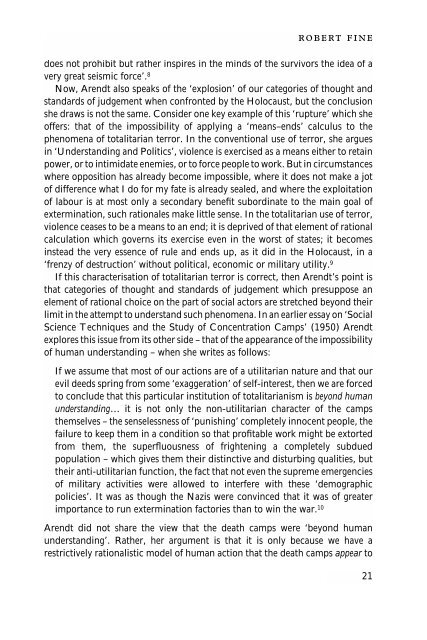Create successful ePaper yourself
Turn your PDF publications into a flip-book with our unique Google optimized e-Paper software.
obert fine<br />
does not prohibit but ra<strong>the</strong>r inspires in <strong>the</strong> minds of <strong>the</strong> survivors <strong>the</strong> idea of a<br />
very great seismic force’. 8<br />
Now, Arendt also speaks of <strong>the</strong> ‘explosion’ of our categories of thought and<br />
standards of judgement when confronted by <strong>the</strong> <strong>Holocaust</strong>, but <strong>the</strong> conclusion<br />
she draws is not <strong>the</strong> same. Consider one key example of this ‘rupture’ which she<br />
offers: that of <strong>the</strong> impossibility of applying a ‘means–ends’ calculus to <strong>the</strong><br />
phenomena of totalitarian terror. In <strong>the</strong> conventional use of terror, she argues<br />
in ‘Understanding and Politics’, violence is exercised as a means ei<strong>the</strong>r to retain<br />
power, or to intimidate enemies, or to force people to work. But in circumstances<br />
where opposition has already become impossible, where it does not make a jot<br />
of difference what I do for my fate is already sealed, and where <strong>the</strong> exploitation<br />
of labour is at most only a secondary benefit subordinate to <strong>the</strong> main goal of<br />
extermination, such rationales make little sense. In <strong>the</strong> totalitarian use of terror,<br />
violence ceases to be a means to an end; it is deprived of that element of rational<br />
calculation which governs its exercise even in <strong>the</strong> worst of states; it becomes<br />
instead <strong>the</strong> very essence of rule and ends up, as it did in <strong>the</strong> <strong>Holocaust</strong>, in a<br />
‘frenzy of destruction’ without political, economic or military utility. 9<br />
If this characterisation of totalitarian terror is correct, <strong>the</strong>n Arendt’s point is<br />
that categories of thought and standards of judgement which presuppose an<br />
element of rational choice on <strong>the</strong> part of social actors are stretched beyond <strong>the</strong>ir<br />
limit in <strong>the</strong> attempt to understand such phenomena. In an earlier essay on ‘<strong>Social</strong><br />
Science Techniques and <strong>the</strong> Study of Concentration Camps’ (1950) Arendt<br />
explores this issue from its o<strong>the</strong>r side – that of <strong>the</strong> appearance of <strong>the</strong> impossibility<br />
of human understanding – when she writes as follows:<br />
If we assume that most of our actions are of a utilitarian nature and that our<br />
evil deeds spring from some ‘exaggeration’ of self-interest, <strong>the</strong>n we are forced<br />
to conclude that this particular institution of totalitarianism is beyond human<br />
understanding… it is not only <strong>the</strong> non-utilitarian character of <strong>the</strong> camps<br />
<strong>the</strong>mselves – <strong>the</strong> senselessness of ‘punishing’ completely innocent people, <strong>the</strong><br />
failure to keep <strong>the</strong>m in a condition so that profitable work might be extorted<br />
from <strong>the</strong>m, <strong>the</strong> superfluousness of frightening a completely subdued<br />
population – which gives <strong>the</strong>m <strong>the</strong>ir distinctive and disturbing qualities, but<br />
<strong>the</strong>ir anti-utilitarian function, <strong>the</strong> fact that not even <strong>the</strong> supreme emergencies<br />
of military activities were allowed to interfere with <strong>the</strong>se ‘demographic<br />
policies’. It was as though <strong>the</strong> Nazis were convinced that it was of greater<br />
importance to run extermination factories than to win <strong>the</strong> war. 10<br />
Arendt did not share <strong>the</strong> view that <strong>the</strong> death camps were ‘beyond human<br />
understanding’. Ra<strong>the</strong>r, her argument is that it is only because we have a<br />
restrictively rationalistic model of human action that <strong>the</strong> death camps appear to<br />
21

















